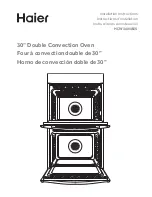
en
How it works
40
Baking on two or more levels
Shelf position
3 levels
¡
Baking tray
¡
Universal pan
¡
Baking tray
5
3
1
4 levels
¡
4 wire racks with greaseproof pa-
per
5
3
2
1
Use the 4D hot air heating function.
Notes
¡
Items that are placed in the appliance on baking
trays or in baking tins/dishes at the same time will
not necessarily be ready at the same time.
¡
If you opt for steam-assisted cooking, you can only
cook on one level.
¡
If you opt for cooking in combination with the mi-
crowave mode, you can only cook on one level.
29.3 Roasting, braising and grilling tips
¡
The recommended settings are for fridge-temperat-
ure food and unstuffed, oven-ready poultry.
¡
Place the poultry onto the cookware breast-side or
skin-side down.
¡
Turn roasting joints, grilled items or whole fish after
approx. ½ to ⅔ of the specified time.
¡
Roasting on the wire rack
Food roasted on the wire rack will become very crispy
on all sides. You can roast large poultry, for example,
or multiple individual pieces at the same time.
¡
Roast pieces of a similar weight and thickness. The
grilled food will brown evenly and will remain succu-
lent and juicy.
¡
Place the food to be roasted directly on the wire
rack.
¡
To catch any liquids that drip down, place the uni-
versal pan into the cooking compartment one level
below the wire rack.
¡
Add up to ½ litre of water to the universal pan, de-
pending on the size and type of food that you want
to roast.
You can make a sauce from the juices that are col-
lected. This also means that less smoke is pro-
duced and the cooking compartment does not be-
come as dirty.
Roasting in cookware
If you cover the cookware when you cook your food,
this will keep the cooking compartment cleaner.
General information about roasting in cookware
¡
Use heat-resistant, ovenproof cookware.
¡
Place the cookware on the wire rack.
¡
Glass cookware is best.
¡
Follow the manufacturer's instructions for your roast-
ing dishes.
Roasting in uncovered cookware
¡
Use a deep roasting dish.
¡
If you do not have any suitable cookware, you can
use the universal pan.
Roasting in covered cookware
¡
Use a suitable lid that seals well.
¡
When roasting meat, there should be at least 3 cm
between the food and the lid. The meat may ex-
pand.
WARNING ‒ Risk of scalding!
Very hot steam may escape when the lid is opened
after cooking. Steam may not be visible, depending on
the temperature.
▶
Lift the lid in such a way that the hot steam can es-
cape away from you.
▶
Keep children away from the appliance.
Grilling
Grill food if you want it to be crispy.
¡
When grilling several food items, choose pieces that
are of a similar weight and thickness. The grilled
food will brown evenly and will remain succulent
and juicy.
¡
Place the food to be grilled directly onto the wire
rack.
¡
To catch any liquids that drip down, place the uni-
versal pan into the cooking compartment at least
one level below the wire rack.
Notes
¡
The grill element switches on and off continuously.
This is normal. The grill setting that you use determ-
ines how frequently this occurs.
¡
Smoke may be produced when grilling.
29.4 Microwave cooking
If you use the microwave mode, you can reduce the
cooking time considerably.
General information
¡
When using the microwave mode, the cooking time
is determined based on the total weight.
If you want to cook a quantity that differs from the
specified quantity, the general rule is
Double the
quantity requires just under double the cooking
time
.
¡
The food transfers heat to the cookware. The cook-
ware can become very hot.
¡
In the main part of the instruction manual, you will
find information on how to configure the microwave
and microwave combination oven settings.
– →
"Microwave combination", Page 22
– →
Cooking, braising or steaming using the
microwave mode
¡
Use microwave-safe cookware with a lid. Alternat-
ively, you can use a plate or special microwaveable
film to cover the dish.
¡
For cereal products, e.g. rice, use deep cookware
with a lid. Cereal products foam a lot during cook-
ing. Add liquid in accordance with the instructions
and information provided in the recommended set-
tings tables.
















































